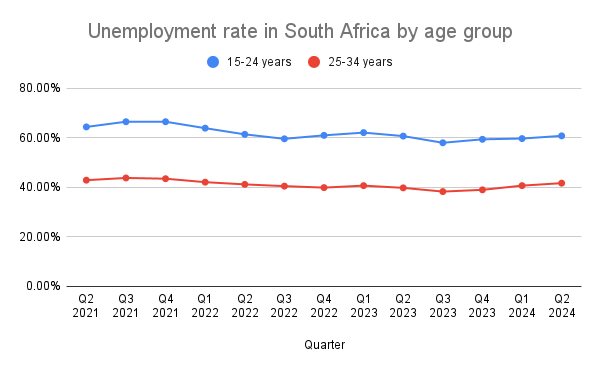Rising unemployment: Are trade unions becoming less relevant?
- thatogololo8
- Sep 2, 2024
- 4 min read
With unemployment on the rise, trade union membership continues to shrink.
Precious Moyo, a former general worker, is one among many young people that no longer see value in trade union membership. In her case the views stem from experience. Experience in the self-proclaimed ‘revolutionary union most loved by workers’, the National Transport Movement.
“I was in a trade union, but I did not even have that knowledge of... my rights as a worker. They were not teaching us anything. The thing I hated about that Union is that they were only negotiating with the bosses. [T]hey never asked us as workers ‘[H]ow do you feel? How do you want to take this matter?’ They would come to us just to inform us what the bosses say.” Moyo said.
Trade union membership has been dropping. In 2023, the Department of Employment and Labour announced that only 23% of the workforce belong to a trade union. What is unclear is what the largest contributing factor behind this decline is.
Young people no longer see the value in trade unions. Job scarcity in South Africa has created an environment where they do not wish to antagonise their employer in fear of retrenchment or disciplinary action. These sentiments are expressed by Labour Attorney, Michael Begraim, who has been acting for and against Trade Unions of many sizes for the past 41 years. Begraim suggests that it is due to young people that enter the workforce not joining any of the 230 registered trade unions. “One trade union (name withheld) hasn’t had anyone under the age of 30 join them for the last two years… When people eventually find a job, they’re not looking for fights”, Begraim says. Section 213 of the Labour Relations Act defines a trade union as "an association of employees whose principal purpose is to regulate relations between the employees and employers.” With 8.4 million unemployed people in the second quarter of 2024, there is much less incentive to engage with an employer in the face of a 33.5% unemployment rate.

Trevor Shaku of the South African Federation of Trade Unions (SAFTU) believes young people who join the workforce do not instantly see the need for trade unions and therefore do not register for one until they have been dismissed. “It’s an insurance policy but people are not looking at it like that,” confirms Begraim.
Workplace casualisation, where permanent employees are replaced with casual and contract workers, motivates Shaku to agree that “[W]orkers who are employed in such particular precarious work do not join trade unions for fear that the employers will terminate the employment.” Sizabesweek Milambo, a former employee of Distell Group Limited (prior to being acquired by Heineken), informed Wits Vuvuzela that they were told by their employers that they were not allowed to be under any trade unions because they were not easily organised.
While this may contribute to trade union apathy, Statistics South Africa recorded that there was, in fact, a decrease in contract-based work between 2023 and 2024. Therefore, worker casualisation cannot be the root cause of this issue.
With 158 000 more people unemployed in the second quarter of 2024, and 139 000 of those being between 15 and 24 years old, the idea that such high youth unemployment will actively prevent people from being able to join trade unions may ring true.
Koketso Phasha, spokesperson for SAFTU affiliate, General Industries Workers Union of South Africa (GIWUSA), agrees. “What are you going to pay for your trade union membership with if you're not employed?” he says.
Disillusionment with the formal system may be another cause of the overall decline in membership. The Casual Workers Advice Office (CWAO), which records the strikes taking place across the country, noted that in 2023, the majority of strikes were unprotected “wildcat” strikes. This means they were not sanctioned by any formal trade union. Shaku says the workers involved in these wildcat strikes are not part of any trade union.
Yet according to the Department of Employment and Labour - reported in CWAO’s 2023 annual report regarding strikes - of the 61 recorded wildcat strikes, only 10 were from non-union workers. With such a prevalence of wildcat strikes, workers have become disillusioned with the process through formal trade unions.
“We have noted that a lot of people… do not have an idea of the work that is done by the trade unions and they do not appreciate the work that is done, hence they are not willing to join,” says the spokesperson of the largest public sector union in South Africa, the National Education, Health and Allied Workers' Union (NEHAWU), Lwazi Nkolonzi. “I want to dismiss this notion that it’s young people. It’s general. It’s across the spectrum that [people] are not joining.”
Historically, trade unions have played a key role in the political discourse of South Africa. Notably, President Cyril Ramaphosa was the founder of the National Union of Mineworkers (NUM) in 1982. Yet in the modern era, where the demands of trade unions have changed since the advent of democracy, previous relationships such as the tripartite alliance between the Congress of South African Trade Unions, the South African Communist Party and the ANC are no longer attracting people.
“Traditional unions (such as NUM) shifted focus from representing workers.” says Milambo.
What we are left with is a declining number of actual members and members struggling to see the appeal in the formal system in place. “Trade unions are a business, and they need to entice people to join” Begraim says, but how do they appeal to young people in an era where they’re viewed as being more political bodies than representative ones?
Some trade unions are attempting to bolster their student chapters on university campuses to bridge this information gap. The South African Democratic Teachers Union (SADTU) is one such organisation. “[SADTU] usually would recruit in the education faculties, the students who are in their third, second and fourth year. And that is trying to bridge the gap of this lack of interest” says Shaku. Whether this method will work remains to be seen as SADTU seems to be the only union with a significant foothold in student spaces.


Comments